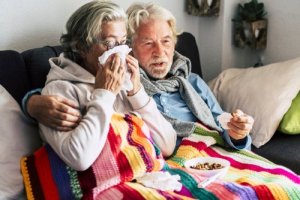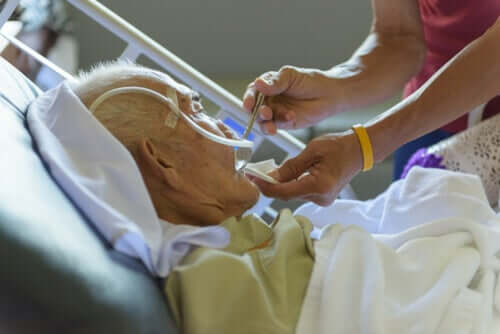Who is Most Vulnerable to COVID-19?


Written and verified by the doctor Leonardo Biolatto
The fact that there are people who are far more vulnerable to COVID-19 than others is perhaps the real urgency behind the containment and quarantine measures being taken around the world. These at-risk groups suffer most from the virus passing through their bodies.
The pandemic has spread across country borders. The virus that began its journey in the city of Wuhan, China, is now multiplying at a frightening rate in virtually every country in the world. Studies of the coronavirus genome have detected the particle that’s circulating is no longer the same as the original particle that left China. Although it’s essentially the same virus, it has since mutated its genetic information.
However, its epidemiological profile seems to remain the same. It’s transmitted between humans through respiratory droplets and it can remain on surfaces for some time. Human-to-human transmission of this coronavirus is high. It has a high rate of transfer between people thanks to the proteins in its coating, which adhere to human cell receptors. It generates the most damage in the pulmonary alveoli.
However, not all people are equally vulnerable to COVID-19. In this article, we’ll tell you which groups are at greatest risk.
The elderly are among the most vulnerable to COVID-19
One of the most affected groups suffering the consequences of the coronavirus is the elderly, especially those over 65. Scientists have noted that the death rate increases markedly after the age of 65.
According to available data, COVID-19 causes death in almost 4% of those infected, but those over 80 years of age have a mortality rate of 15% if they’re infected. These statistics show that the elderly require greater attention and care during the pandemic.
As with other viral respiratory infections – seasonal influenza, for example – particles of infectious agents take advantage of the poor condition of aging respiratory cells. The immune system is slow in reacting, and its response doesn’t come in time. Similarly, older people are more vulnerable to COVID-19 because they often suffer from underlying conditions that accompany their age. Those with diabetes, hypertension, and cancer are particularly affected.

The chronically ill are also some of the most vulnerable to COVID-19
The people most vulnerable to COVID-19 are the chronically ill. In this group we have to include people with:
- Heart failure
- Diabetes
- Kidney failure
- High blood pressure
- Chronic obstructive pulmonary disease
- Cancer
The chronically ill, in many cases, don’t only suffer due to the particular condition they’re suffering for. They also suffer additionally because of the medication they’re taking. The medications themselves can have their own respective adverse effects and interactions.
For example, if we consider patients who are taking anticoagulants, if they get infected and get pneumonia as a result, the consequences will be far more serious for them. Intensive care procedures can rupture blood vessels, which, because of the anticoagulant drugs, take longer to repair themselves.
One study, in particular, linked cardiovascular disease to an increased risk of death from coronavirus. The patients studied also had high biochemical inflammation levels in their blood.

Find out more: How to Protect Yourself Against Coronavirus If You Have Diabetes
Other groups and their relationship with COVID-19
Other people that could be vulnerable to COVID-19 are pregnant women. However, the isolation measures here are precautionary as there is still no specific data on the risk factors. As far as we know so far, the risk for pregnant women is similar to that of the rest of the population. This differs from the H1N1 influenza pandemic in 2009 when pregnant women suffered worse.
Also, vertical transmission of the virus has not been proven so far. Thus, there is no evidence that COVID-19 crosses the placenta and passes from the mother to the fetus yet.
Another scientific study differentiated those affected by coronavirus according to their blood group. Preliminary results suggest that people with blood group A are at significantly higher risk than those with blood group O. However, the research was limited in its number of participants.
To keep in mind
Those most vulnerable to COVID-19 are at significant risk of suffering complications that lead to death. We need to employ extra care, hygiene, and social isolation with these at-risk groups. Health systems around the world simply won’t have the bed space to meet the demand to care for people with serious illnesses, so we must do our part to reduce the infection curve.
All cited sources were thoroughly reviewed by our team to ensure their quality, reliability, currency, and validity. The bibliography of this article was considered reliable and of academic or scientific accuracy.
- Lu, Roujian, et al. “Genomic characterisation and epidemiology of 2019 novel coronavirus: implications for virus origins and receptor binding.” The Lancet 395.10224 (2020): 565-574.
- Zhang, Haibo, et al. “Angiotensin-converting enzyme 2 (ACE2) as a SARS-CoV-2 receptor: molecular mechanisms and potential therapeutic target.” Intensive Care Medicine (2020): 1-5.
- Zheng, Ying-Ying, et al. “COVID-19 and the cardiovascular system.” Nature Reviews Cardiology (2020): 1-2.
- Dominguez, Adrian Naranjo, and Alexander ValdÃ. “COVID-19. Punto de vista del cardiólogo.” Revista Cubana de CardiologÃa y CirugÃa Cardiovascular 26.1 (2020): 951.
This text is provided for informational purposes only and does not replace consultation with a professional. If in doubt, consult your specialist.








